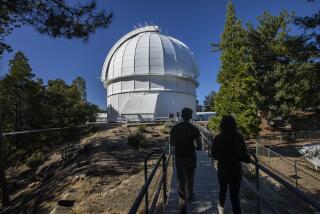Radio Observatory Gets Last-Minute Funding
- Share via
BORREGO SPRINGS — A day before it was to shut down, a deep-space observatory in Borrego Springs received the funding it needs to stay open for at least three more months and continue its research of communications and climate.
The 25-year-old Clark Lake Radio Observatory was scheduled to close last Friday, but its directors signed a three-month, $75,000 Navy contract on Thursday and, the same day, received the promise of more funding from the University of Maryland, which owns the observatory.
Michael A’Hearn, acting director of the University of Maryland’s astronomy program, said a one-year $300,000 Navy contract is in the works but it is unknown when a decision will be reached.
“At the moment we are expending university money, but that cannot go on indefinitely,” A’Hearn said. “The time to consider cutting our losses is pretty soon. That’s why we had scheduled it to close last week.”
The Navy is interested in the observatory’s work because of the facility’s study of the ionosphere, the outermost layer of the earth’s atmosphere. The ionosphere plays a role in the effectiveness of over-the-horizon radar.
The observatory, which uses 720 tepee-like antennas to collect longer radio waves, is the only observatory outside the Soviet Union that collects low-frequency radio signals.
Alex Szavo, a research assistant at the observatory, said the research conducted at Clark Lake is necessary to the understanding of the fields of both communication and climate.
“It is our study of the ionosphere . . . which can help us understand the whys behind things like the northern lights and El Nino,” said Szavo. “What happens on the sun’s surface directly affects the ionosphere, and we are studying how this filters down to ground level.”
Szavo said it has been difficult for himself and the three other full-time employees to continue working as if it was “business as usual” during the observatory’s fiscal crisis.
“First it was the end of May that we were supposed to close down,” he said. “Then the Navy gave us an extension until Aug. 15. Things were very difficult. It wasn’t easy to work under those conditions, when you’re doing the research and you’re thinking the whole time, ‘What does it matter? It’s all going to be mothballed anyway.’
“Needless to say, we’re very relieved and happy to know things are continuing.”
The Clark Lake Radio Observatory’s financial woes began last spring, when its directors were informed by the university that National Science Foundation (NSF) cutbacks meant the observatory’s $400,000 annual budget would have to be scrapped.
“For the last two years, the university has paid out over $100,000 from its own budget to keep the observatory going,” A’Hearn said. “At the moment, things are running at a bare-bones level. No spare parts have been ordered, and we’ve got the bare minimum of people working there.”
A’Hearn said the university is considering going to the NSF with another funding request, but it will not approach the Maryland Legislature, which funds other university projects through bonds.
“The university has never gone to the state Legislature because we don’t think they would have much interest in funding a facility in California,” A’Hearn said. “We have not made a decision to ask the NSF for any money, but we are considering it.”
More to Read
Sign up for Essential California
The most important California stories and recommendations in your inbox every morning.
You may occasionally receive promotional content from the Los Angeles Times.










